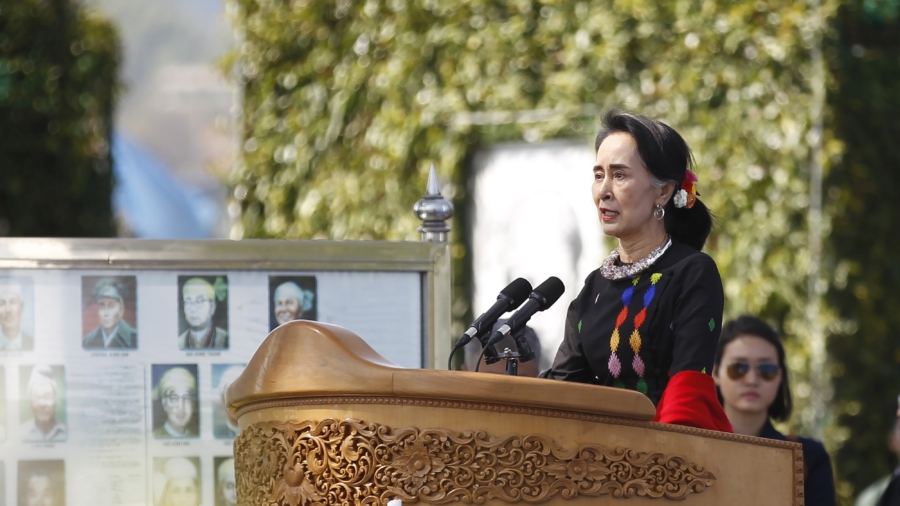NAYPYITAW, Burma—Burmese military television says the military has taken control of the country for one year.
An announcer on military-owned Myawaddy TV made the announcement Monday morning. The announcement follows days of concern about the threat of a military coup and comes as the country’s new Parliament session was to begin.
The Irrawaddy, an established online news service, reported that State Counsellor Aung San Suu Kyi, the nation’s top leader, and the country’s president, Win Myint, were both detained in the pre-dawn hours of Monday. The news service cited Myo Nyunt, a spokesman for Suu Kyi’s ruling National League for Democracy party.
The army said it had carried out the detentions in response to “election fraud,” handing power to military chief Min Aung Hlaing and imposing a state of emergency for one year, according to the statement on Myawaddy TV.
“The voter lists which were used during the multi-party general election which was held on the 8th of November were found to have huge discrepancies and the Union Election Commission failed to settle this matter,” the statement said.
“Although the sovereignty of the nation must derive from the people, there was terrible fraud in the voter list during the democratic general election which runs contrary to ensuring a stable democracy. A refusal to settle the issue of voter list fraud and a failure to take action and follow a request to postpone lower-house and upper-house parliament sessions is not in accordance with article 417 of the 2018 constitution that refers to ‘acts or attempts to take over the sovereignty of the Union by wrongful forcible means’ and could lead to a disintegration of national solidarity.
“Due to such acts, there have been a lot of protests going on in townships and cities in Myanmar to demonstrate their mistrust toward UEC. Other parties and people have also been found conducting different kinds of provocations including displaying flags which are very damaging to national security.
“Unless this problem is resolved, it will obstruct the path to democracy and it must therefore be resolved according to the law. Therefore, the state of emergency is declared in accordance with article 417 of the 2008 constitution.In order to perform scrutiny of the voter lists and to take action, the authority of the nation’s law making, governance and jurisdiction is handed over to the Commander in Chief in accordance with the 2008 constitution article 418, sub article (a).
“The state of emergency is effective nationwide and the duration of the state of emergency is set for one year, starting from the date this order is announced in line with article 417 of the 2008 constitution.”

Phone and internet access to Naypyitaw was lost and Suu Kyi’s National League for Democracy party could not be reached.
The U.S., Australia and others were concerned by the reports and urged Burma’s military to respect the rule of law.
“The United States is alarmed by reports that the Burmese military has taken steps to undermine the country’s democratic transition, including the arrest of State Counselor Aung San Suu Kyi and other civilian officials in Burma,” White House spokesperson Jen Psaki said in a statement from Washington. She said President Joe Biden had been briefed on the reported developments.
“The United States opposes any attempt to alter the outcome of recent elections or impede Burma’s democratic transition, and will take action against those responsible if these steps are not reversed,” the statement said. Burma is also known as Myanmar.

Australian Foreign Minister Marise Payne called for the release of Suu Kyi and others reported to be detained. “We strongly support the peaceful reconvening of the National Assembly, consistent with the results of the November 2020 general election,” she said.
Burmese lawmakers were to gather Monday in the capital Naypyitaw for the first session of Parliament since last year’s election.
Online news portal Myanmar Now cited unidentified sources about the arrest of Suu Kyi and the NLD’s chairperson around dawn and did not have further details. Myanmar Visual Television and Myanmar Voice Radio posted on Facebook around 6:30 a.m. that their programs were not available to broadcast regularly.
The 75-year-old Suu Kyi is by far the country’s most dominant politician, and became the country’s leader after leading a decades-long nonviolent struggle against the military junta’s rule.
Suu Kyi’s party captured 396 out of 476 seats in the combined lower and upper houses of Parliament in the November polls, but the military holds 25 percent of the total seats under the 2008 military-drafted constitution and several key ministerial positions are also reserved for military appointees.

The military, known as the Tatmadaw, charged that there was massive voting fraud in the election. The state Union Election Commission last week rejected its allegations.
Amid the bickering over the allegations, the military last Tuesday ramped up political tension when a spokesman at its weekly news conference, responding to a reporter’s question, declined to rule out the possibility of a coup. Maj. Gen. Zaw Min Tun elaborated by saying the military would “follow the laws in accordance with the constitution.”
Using similar language, Commander-in-Chief Senior Gen. Min Aung Hlaing told senior officers in a speech Wednesday that the constitution could be revoked if the laws were not being properly enforced. Adding to the concern was the unusual deployment of armored vehicles in the streets of several large cities.
On Saturday, however, the military denied it had threatened a coup, accusing unnamed organizations and media of misrepresenting its position and taking the general’s words out of context.
On Sunday, it reiterated its denial, this time blaming unspecified foreign embassies of misinterpreting the military’s position and calling on them “not to make unwarranted assumptions about the situation.”
Reuters contributed to this report

